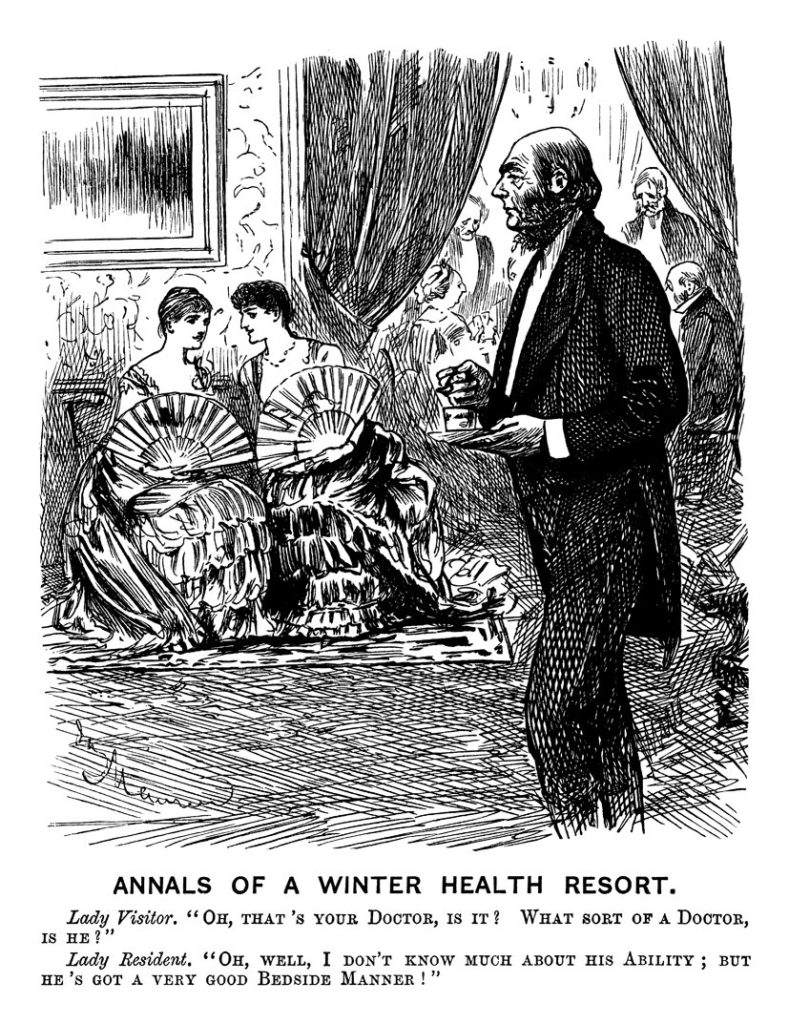How is bedside manner defined? Well it isn’t limited to interactions at the bedside between patients and healthcare providers.
Sure, nursing requires mastering technical and procedural skills, but it also demands a human connection—what many refer to as “bedside manner.”
According to Emily Hayden in Why Bedside Manner Matters in Nursing, it’s “the way in which nurses or other medical professionals interact and communicate with their patients.”
Discussing the meaning of bedside manner is important because it highlights the current underdeveloped soft skills in nursing.
The Problematic History and Future
The first popular use of “bedside manner” wasn’t positive. If anything, it began a tradition of seeing soft skills in healthcare as frivolous. Most dictionaries and etymology websites agree that “bedside manner” was coined in a George du Maurier cartoon in 1884. Here’s the text from the cartoon:
Lady Visitor: “Oh, that’s your Doctor, is it? What sort of Doctor, is he?”
Lady Resident: “Oh, well, I don’t know much about his Ability, but he’s got a very good Bedside Manner.”
This cartoon separates “ability” from a “good bedside manner” (i.e. soft skills). Even the terms soft and hard skills carry an implicit hierarchy.
So why does the history and definition of bedside manner matter? Well, this early use of “bedside manner” illuminates a tradition that continues today: a devaluation of soft skills in healthcare.
In fact, today there’s a concern that with everything else required to get through nursing school, new nurses are graduating without being given the opportunity to understand and develop bedside manner. “Schools throughout the country have struggled with finding unique ways to help students understand the importance of empathetic medical care,” said Deborah Swanson of the popular nursing blog, Daily Nurse.
Nursing isn’t alone. Bedside manner training is a hot topic across the spectrum of healthcare providers. Dr. Ronald Epstein, associate professor of Family Medicine and Psychiatry at the University of Rochester opined that “there has been a lot of concern lately over the decline in professionalism of medical trainees. . . . Prior efforts, such as ethics and humanities courses, have failed to produce more caring doctors.” (Epstein, 1999)
How important is bedside manner?
So is the 1850s cartoon right? Is bedside manner really that important? Do soft skills in nursing really matter for effective care?
The short answer is yes. And not just because the experience is more pleasant.
Being in the hospital puts patients in a position of dependence. They may be in a state of extreme weakness, uncertainty, vulnerability, fear. Bedside manner isn’t merely good communication between two people on equal footing. It includes sensitivity to the inequity of the patient-provider relationship.
In Swanson’s post for the Daily Nurse, she reasons that “being empathetic and courteous helps gain a patient’s trust and boosts their confidence, which can equal greater levels of success after discharge.”
Similarly, Chai-Chih Huang, RN, MSN, NE-BC, director of pediatric nursing at UCLA’s Mattel Children’s Hospital, argues that “bedside manner among all medical professionals is a crucial part of their patients’ recovery. Not only does it affect how patients feel in the hospital, but also how much they learn about caring for themselves at home.”
To complete the trifecta of experts, in Hayden’s book, she states that, “the personal connection between patients and nurses are absolutely crucial in a patient’s road to recovery.”
Many nursing professionals agree: there’s a deep correlation between soft skills in nursing and recovery. And since recovery of a patient falls under the definition of “effective care,” soft skills in nursing do matter.
The importance of soft skills in nursing
From analyzing the definition of bedside manner, it’s clear that the nursing community needs a paradigm shift when it comes to soft skills in nursing. For the sooner nursing professionals and higher ed respect and value soft skills, the sooner we’ll see research and curricula that support it.
So along with the skills check-off list, also include soft skills. Check out 5 Keys to an Outstanding Nurse-Patient Relationship to learn more about teaching soft skills in nursing






